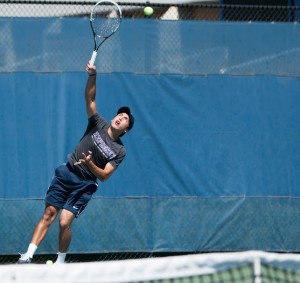A BYU men’s tennis match might remind one of an international tennis tournament.

Members of the men’s team speak with a host of foreign accents, because only three of the players are from the United States. In fact, there are as many players from Australia as there are from the U.S.
The international diversity of the men’s team contrasts sharply with the BYU women’s tennis roster, which only has one player not from the United States.
Men’s No. 1 singles player, and the team’s only senior, Francis Sargeant, is from Beckenham, U.K., and No. 2 Andrey Goryachkov is a lone junior from St. Petersburg, Russia.
The roster includes five sophomores: three from Australia, one from Mexico and one from South Africa.
The widespread distribution of nationalities on the men’s tennis team seems to represent the pattern in collegiate tennis today. The Cougars compete in the regular season as part of the West Coast Conference, which comprises 10 schools. Of these 10 men’s tennis teams for the 2014–2015 season, only 36 of 92 players — 38 percent — are American.
Santa Clara has two players from Russia and one each from Australia, Indonesia and the Republic of Georgia and none from the U.S. The University of San Diego’s team has 10 players; one is American.
The women’s teams in the conference total a 45-American-to-86-total-players ratio: 52 percent.
BYU head coach Brad Pearce attributed the international flavor of his own team to the sport’s worldwide reach, which, he said, is thanks in part to the Internet.
“Tennis is such a worldwide sport,” Pearce said. “You know, it’s exploded across the world.”
Pearce said that in the current recruiting scene, players around the world who are interested in playing collegiate tennis will send a “blanket email” that includes information about their academics and interests, and sometimes video, to college coaches. For the coaches of BYU, however, recruiting can get a little more complicated than it might be for a coach at another university.
“I make it a habit, because of the uniqueness of BYU … before I’ll really get serious about someone, I’ll typically get on a plane and go watch them play in person, meet their family and really see if BYU’s going to be a good fit for them,” Pearce said.
He informs prospective recruits of the Honor Code in his first phone call with them, and it’s not unheard of for players to tell him they aren’t willing to live that way.
“We vet our players pretty carefully,” he said. “With these particular kids, I think they look at it as a positive, so I think that’s why they’re here. For some, it’s not unusual (to hear), ‘Hey thanks, Coach, for informing me of that; I’m not interested.’ So I think it’s good to have that conversation at the very beginning so I’m not wasting anybody’s time.”
The three Americans on the Cougar force this year are all new freshmen, a recruiting class that the Tennis Recruiting Network has ranked No. 1 out of mid-major men’s tennis recruiting classes of 2014.
David Ball, from Palo Alto, California, is a four-star recruit, while Victor Brown, from Rancho Cucamonga, California, and Shane Monroe, from Ventnor, New Jersey, both have five-star rankings.
Pearce said he was pleased with the group’s performance at last week’s BYU Invitational and that his team will be prepared to compete come January.
Fans can catch the Cougars in action (and hear those accents) at the Utah Invitational Oct. 9–11.




